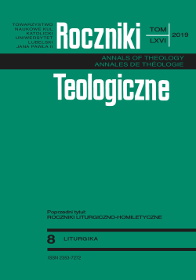Mystery of the Eucharist in the Light of Catecheses from the Agenda of Fr. Hieronim Powodowski and Echoes of the Concil of Trent
Abstract
The Council of Trent undertook the task of presenting the doctrine of the Eucharist, especially in confrontation with the teaching of dissenters. This reflection was systematically included in the council decrees adopted at sessions in 1551 and 1562. At the pastoral level, this teaching, as an aid for priests, was included in the Roman Catechism, published in 1566. According to the teaching of the Council of Trent, catecheses were included in Polish agendas, which were to help the faithful not only understand the theological depth of the sacraments, but also had a parenetic character. An example are catecheses on the Eucharist on the agenda of Fr. Hieronim Powodowski.
Biblical texts, both Old Testament images and New Testament events, were an important foundation in the Powodowski’s catecheses on the Eucharist. It is worth emphasizing the presentation of the Eucharist in the light of the whole history of salvation—from the creation of the world to the apogee in the mystery of Redemption. Christ’s call: “do this in remembrance of me” has been realized in the Church since the beginning of Christianity. This sacrament was seen as the source of all sacraments. The essential content of this approach is the fact that Christ is really present in the mystery of the Eucharist. Accepting this truth requires an attitude of faith in the real presence of Christ in Mass. It assumes an attitude of faith in transubstantiation, emphasizing the importance of the Eucharist as a sacrifice. Preparing the faithful to receive Holy Communion was a separate issue. Attention was drawn to the need for sacramental confession in the case of grave sins. At the same time, the Eucharist protects against grave sins, forgives venal sins, strengthens faith, hope and love, while maintaining piety. Therefore, humbleness and repentance were required, following the example of the Gospel centurion, and they were advised not to absentmindedly. A historical look at the mystery of the Eucharist will certainly contribute to the deepening of Eucharistic awareness among the faithful and will contribute to full, conscious and active participation in the Holy Mass.
References
Agenda sacramentalia, ad vsvm dioecesis Varmiensis accommodata. Cvm adivnctis verbis et admonitionievs polonicis et germanicis. Opus cuiuslibet Diocoesis Parochis & Sacerdotibus perutile. Coloniae, apvd maternvm cholinvm. MDLXXIIII. Cum Gratia & Priuileg. Caes. Maiest.
Agenda sev ritvs sacramentorvm ecclesiasticorvm, Ad vniformem Ecclesiarum per vniuersas Prouincias Regni Poloniae vsum, officio Romano conformati. Ex decreto Synodi Prouincialis Petricouiensis, denuo conscripti & editi, Studio & opera Reuerendi D. Hieronymi Pouodouij, Archipresbyteri & Canonici Cracouien[sis]. Praemissa est singulis Sacramentis summaria illorum doctrina utilis & necessaria. Cum Gratia & Privilegio S. R. M. Cracoviae: In Architypographia Regia & Ecclesiastica, Lazari, Anno Domini, MDXCI.
Agendorvm ecclesiasticorvm liber, in vsum Prouinciae Gnesnensis conscriptus. Coloniae. Apvd maternvm cholinvm, MDLXXIX, Cum Gratia & Priuilegio Caes. Maiest.
Arx Walter von, Zur Entstehungsgeschichte des Rituale, „Zeitschrift für schweizerische Kirchengeschichte” 63 (1969), s. 39-57.
Augustinus S., Enarratio in Psalmum CXLIII. PL 37, 1855-1869.
Augustinus S., Epistula 143, Marcellino. PL 22, 1221-1310.
Dokumenty Soborów Powszechnych, t. IV/1: (1511-1870) Lateran V, Trydent, Watykan I, układ i oprac. Arkadiusz Baron, Henrk Pietras, Kraków: Wydawnictwo WAM 2005, Kraków 2005.
Boguniowski Józef W., Rozwój historyczny ksiąg liturgii rzymskiej do Soboru Trydenckiego i ich recepcja w Polsce, Kraków: Wydawnictwo UNUM 2001.
Catechismus Romanus ex decreto Concili Tridentini ad parochos Pii V. Pontificis Maximi iussu editus. Editio tertia, t. I, Bielefeldiae et Lipsiae: Sumptu Bernh. Tauchnitz jun. 1867.
Eckmann Augustyn, Przebóstwienie człowieka w pismach wczesnochrześcijańskich, Lublin: Towarzystwo Naukowe KUK 2003.
Franz Adolph, Das Rituale des Bischofs Heinrich I. von Breslau, Freiburg i. Br.: Herder 1912.
Katechizm Kościoła Katolickiego, Poznań: Pallottinum 2002.
Kolberg August, Agenda communis. Die älteste Agenda in der Diözese Ermland und im Deutschordensstaate Preußen nach den ersten Druckausgabe von 1512 und 1520, Braunsberg: Komm.-Verlag Rudlowski 1903.
Krakowiak Czesław, Komunia święta. I. W Kościele katolickim, w: Encyklopedia katolicka, t. 9, Lublin: Towarzystwo Naukowe KUL 2002, kol. 495-502.
Lekan Janusz, Konkomitancja, w: Encyklopedia katolicka, t. 9, Lublin: Towarzystwo Naukowe KUL 2002, kol. 636.
Maciukiewicz Maciej, Rytuał, w: Encyklopedia katolicka, t. 17, Lublin: Towarzystwo Naukowe KUL 2012, kol. 717-718.
Nadolski Bogusław, Liturgika, t. 1: Liturgika fundamentalna, Poznań: Pallottinum 1989.
Neunheuser Burkhard, Mysterium Paschale. Das österliche Mysterium in der Konzilskonstitution «Über die heilige Liturgie», w: Österliches Heilsmysterium. Das Paschamysterium – Grundmotiv der Liturgiekonstitution. Gesammelte Aufsätze, red. Theodor Bogler, (Liturgie und Mönchtum 36), Maria Laach: Verlag Ars Liturgica 1966, s. 12-33.
Nowodworski Michał, Katechizm Rzymski, w: Encyklopedja Kościelna podług teologicznej encyklopedji Wetzera i Weltego z licznemi jej dopełnieniami, wyd. M. Nowodworski, t. X, Warszawa: W Drukarni Czerwińskiego i Spółki 1873, s. 228.
Pałęcki Waldemar, Eucharystia w świetle teologii misteriów i posynodalnej adhortacji „Sacramentum Caritatis” papieża Benedykta XVI, „Liturgia Sacra” 14 (2008), nr 2, s. 343-361.
Skrzyniarz Ryszard, Powodowski Hieronim, w: Encyklopedia katolicka, t. 16, Lublin: Towarzystwo Naukowe KUL 2011, kol. 141-142.
Urban Wincenty, Agendy katolickie polskie, Encyklopedia katolicka, t. 1, Lublin: Towarzystwo Naukowe KUL 1973, kol. 172-174.
Copyright (c) 2019 Roczniki Teologiczne

This work is licensed under a Creative Commons Attribution-NonCommercial-NoDerivatives 4.0 International License.





